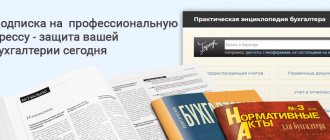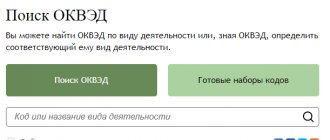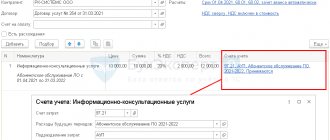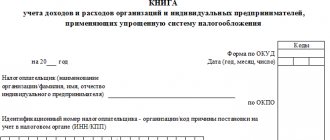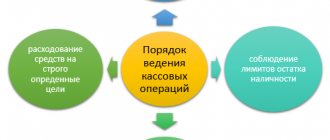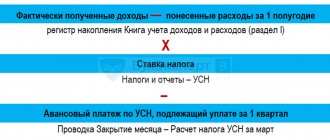Small Russian enterprises are entitled to certain support from the state. Who exactly can count on it and under what conditions? To answer this question, it is necessary to consider the criteria for classification as small and medium-sized businesses. This division has become especially relevant this year, because business support measures related to the spread of the new COVID-19 infection are more focused on SMEs.
The conditions that must be met to be classified as one or another category of small and medium-sized businesses are spelled out in Article 4 of Law No. 209-FZ dated July 24, 2007. Next, we will analyze in detail the requirements for SMEs and see who applies to them.
Free accounting services from 1C
Who belongs to small businesses
According to Art. 4 of the Law “On the Development of Entrepreneurship in the Russian Federation” dated July 24, 2007 No. 209-FZ, various economic entities are classified as SMBs (small businesses), namely:
- individual entrepreneurs;
- peasant (farm) farms;
- business societies;
- business partnerships;
- consumer cooperatives;
- production cooperatives.
All of them must comply with the main and additional criteria for small businesses outlined in law 209-FZ. These relate to the fundamental characteristics of the management of any company, namely: the number of employees, income received and the composition of the authorized capital. On their basis, it is determined whether the organization can be considered small or whether it must be classified among other categories of economic entities. Let us consider what criteria characterize a small enterprise in more detail.
Important! Recommendation from ConsultantPlus All SMEs are included in a special register on the Federal Tax Service website. If you do not find your SME there, submit a request to check the registry information. For more details, see K+. Trial access is available for free.
Financial benefits and tax features
This kind of relaxation not only improves the conditions for doing business, but also provides direct financial support. Particularly important are subsidies that reimburse part of the enterprise’s costs:
- under leasing agreements;
- to pay interest to the bank on loans or borrowings.
A subsidy of up to half a million is provided for start-up entrepreneurs. According to the Federal program, valid until 2022, small and medium-sized businesses are provided not only with free benefits, but also with grants.
In matters of paying taxes, medium-sized enterprises lose out compared to small ones. Not everyone can take advantage of the simplified and patent tax payment systems. Income and headcount limits allow the implementation of the simplified tax system only at enterprises in certain industries. But PSN is only possible for individual entrepreneurs.
You can switch to paying UTII only if you have no more than 100 employees.
Basic and additional criteria indicating small enterprises
The first criterion that you need to focus on is the income received over the past calendar year from all types of activities. The maximum value of this criterion is 800 million rubles.
In addition to the profitability parameter, the main criteria include the average number of personnel for the past calendar year. For small enterprises this characteristic ranges from 16–100 people. The average headcount is calculated based on a certain rule, namely:
- First, the average number of full-time employees is calculated.
- After this, the average number of part-time personnel is determined.
As for additional criteria, these include the total percentage of membership of other economic entities in the authorized capital of the entity. Firstly, for business partnerships or companies, this indicator should have no more than 25% of the total participation of the Russian Federation, constituent entities of the Russian Federation or municipalities, public organizations or charitable foundations. Secondly, the management company must have no more than 49% of the participation share of other legal entities (not considered SMEs) or foreign companies. That is, at least 51% of the authorized capital must belong to individuals or small and medium-sized businesses.
Legal entities whose activities are related to intellectual developments in various fields, for example, the creation of information databases, industrial designs, etc., may also meet the criteria for a small enterprise.
In relation to joint stock companies, they can also have the status of a small organization, only in this situation their shares must belong to the innovative sector of the state economy.
Basic criteria for a medium-sized enterprise
Medium-sized businesses may include:
- Individual entrepreneurs, farms.
- Legal entities: commercial companies, consumer cooperatives.
All medium-sized businesses are required to register. Information about them appears in the unified state register.
Basic and additional criteria for medium-sized businesses
Medium-sized businesses must meet the following criteria:
- The total share of all participants is no more than 25% of the authorized capital. This condition does not apply to shares of investment funds. The total share of foreign entities and enterprises not related to small businesses is no more than 49%. This restriction does not apply to entities engaged in intellectual activity.
- The average number of employees is from 101 to 250 employees.
- Income from the company's activities over the past year is no less than 800,000,000 rubles and no more than 2,000,000,000,000 rubles. When calculating income, VAT is deducted from the total amount.
All values considered are determined on the basis of official documents.
Does the company belong to the SMP (step-by-step table for determining the status of the company)
Let's look at the algorithm for determining a company's category step by step.
| Step | Algorithm |
| 1. Determine the average number of personnel for the past calendar year | Calculated by calculation. Information for calculation is taken from information submitted to the tax office. For small businesses the figure ranges from 16 to 100 people |
| 2. We calculate the income acquired over the past calendar year from all types of activities | The information is taken from the previous year's tax return. When combining modes, income is summed up for each declaration. For small enterprises, the value should not exceed 800 million rubles. |
| 3. We determine the percentage of membership of other companies in the authorized capital of the company | 1. The percentage of membership of the state, constituent entities of the Russian Federation, municipalities, public organizations or charitable foundations is no more than 25%. 2. The percentage of membership of foreign legal entities or Russian legal entities (not having the status of a small enterprise) is no more than 49% |
Administrative benefits in 2016
To reduce external management pressure on enterprises, the state made some concessions. They provide for simplification of reporting procedures, cash payments and registration of employees, which sooner or later will serve as a reason for many entrepreneurs to emerge from the shadows.
| Administrative benefit | Who can use/clarifications |
| Possibility to carry out cash payments without cash registers | Payers of UTII |
| Keeping accounting records in a simplified form | Mandatory condition: annual revenue - up to 79.74 million rubles, number of employees - up to 100 people. Therefore, only medium-sized enterprises in certain sectors of the economy can use the benefit. |
| Concluding premises rental agreements with local authorities. Preferential conditions are valid for 5 years | Managers of medium-sized enterprises. Tenant companies have a pre-emptive right to purchase such property |
| Availability of a state guarantee when applying for a bank loan | The borrower's chances of receiving a positive response from the bank increase |
| Participation in government procurement | In the total volume of government procurement for the year, at least 15% must be products, goods and services produced in SMEs |
Important! Benefits related to accounting do not apply to JSCs and LLCs with income over 800 million rubles. For such companies, audits are a mandatory part of their work.
The nuances of small and medium-sized businesses
If a small enterprise meets the 2022-2022 criteria, it is entered into a special register of small and medium-sized businesses. In this case, the organization is not required to submit any special information to the tax authorities or take other actions - it is automatically classified as a small business. Federal Tax Service employees classify companies as small based on the information they provide in the usual manner, which includes:
- average number of employees;
- data from the Unified State Register of Legal Entities or Unified State Register of Individual Entrepreneurs;
- tax returns.
Read about how the SME register is maintained and when it is updated in ConsultantPlus. Trial access to the system can be obtained for free.
It should be noted that enterprises with small status receive the right to use certain benefits in the field of accounting. These include the following points:
- The right not to set a limit on the cash balance in the cash register. If it was installed earlier, management can issue an order to cancel it.
- Possibility of conducting simplified accounting.
- Preferential conditions for special taxation, which are established at the regional level.
- Reduction of inspection period by state regulatory authorities - for small enterprises it is 50 hours per year.
- Some categories of individual entrepreneurs receive tax holidays, which must be specified in the regulatory legal acts of the region.
The following materials will help you understand the nuances of simplified accounting and reporting in small enterprises:
- “Features of accounting in small enterprises”;
- “Simplified accounting reporting for small businesses for 2022.”
SME Register
Companies and individual entrepreneurs that meet the criteria for classification as small and medium-sized businesses are included in the Unified Register of SMEs. The tax service is responsible for its formation and publication. Every year it updates the data in this register taking into account current information, including those that taxpayers submit as part of their reporting.
The register data is available to any user on the Federal Tax Service website. In the search form, it is enough to enter one of the parameters - TIN, OGRN / OGRNIP or company name (full name of the entrepreneur). The minimum set of data about the subject shown after processing the request is as follows:
- company name / individual entrepreneur name;
- TIN, OGRN or OGRNIP;
- main activity;
- what category of SMEs does it belong to;
- date of entry of information into the relevant register;
- an indication of whether the entity is a newly registered entity as well as a social enterprise.
If desired, the SME itself can enter additional information about itself into the register, namely:
- that it produces high-tech / innovative products;
- on participation in government procurement and concluded contracts, as well as in the partnership program with the state;
- your contact details.
Such information is entered into the register upon an application, which a medium or small enterprise can send through the data submission service to the Federal Tax Service, signing with an electronic signature.
The register is updated on August 10 of each year based on reports as of July 1. It is important to submit reports on time, otherwise there is a risk that the data will not be taken into account and the company will not be included in the SME register. For example, it does not include employers who did not timely submit information on the average number of employees and tax returns. If on July 1 of the next year the Federal Tax Service does not have information about income and the number of employees, on August 10 the entity will simply be excluded from the SME register.
When a small enterprise turns into a medium or large one
There are certain circumstances, the occurrence of which will lead to the organization losing its status as a small enterprise. Naturally, this is due to the fact that it will not fall under the criteria of small enterprises in 2020-2021. These conditions include the following:
- If circumstances are associated with an increase in the percentage of participation in the authorized capital above the limit value, then the enterprise will lose its small business status. In this case, the moment of transition to a medium or large enterprise is considered to be the date of making an entry in the Unified State Register of Legal Entities about the change in the authorized capital of the organization.
- If circumstances are associated with an increase in the average number of personnel or income from all types of entrepreneurial activities above the legal limit, the status of a small enterprise is retained by the enterprise for three years. After the expiration of the mentioned period, the small enterprise will lose this status and become medium or large, depending on the value of these criteria, as indicated in paragraph 4 of Art. 4 of Law 209-FZ.
Criteria for enterprises in certain industries
For certain sectors of the economy, different indicators for the number of employees are allowed. Even if it is less than the general criterion, the business is classified as average. The size of medium-sized enterprises in various sectors of the national economy is shown in the table:
| Industry | Number of employees, people | |
| from | before | |
| 1. Advertising agencies, consulting and research organizations | 15 | 50 |
| 2. Tour operators | 25 | 75 |
| 3. Editorial offices of print media | 35 | 100 |
| 4. Retail | 50 | 250 |
| 5. Wholesale | 100 | 100 |
| 6. Furniture making | 150 | 500 |
| 7. Confectionery factory | 400 | 1500 |
| 8. Oil refinery | 2000 | 7000 |
| 9. Car production plant | 10000 | 40000 |
Advertising and tourism activities, publishing newspapers and magazines rarely require a significant number of workers. Therefore, although enterprises employ fewer workers than required by the criterion, they are classified as average.
Results
To be classified as a small enterprise, a company must meet the criteria specified in Law 209-FZ. These include the average number of personnel, income from all types of activities and participation in the authorized capital. If all conditions meet the required values, the company automatically receives small status and is entered by the tax authorities into a special register of small and medium-sized businesses in Russia.
Sources: Law “On the Development of Entrepreneurship in the Russian Federation” dated July 24, 2007 No. 209-FZ
You can find more complete information on the topic in ConsultantPlus. Free trial access to the system for 2 days.
Business criteria in 2022
In 2022, small and medium-sized enterprises include subjects of the Russian Federation registered in a unified register under certain conditions: compliance with the number of employees, a certain annual income, compliance with criteria for shareholders of enterprises. In some cases, the process of creating such enterprises is simplified and has simplified accounting, benefits and support from the state.
Small Business Criteria 2021
Small businesses include individual entrepreneurs carrying out business activities without forming a legal entity, consumer cooperatives, joint-stock companies, limited liability companies and farms. Depending on the number of employees, small businesses are divided into: microenterprises, small and medium-sized enterprises.
Small business has a number of advantages:
- it can be registered independently, remotely and in a simplified form - you need to collect a package of documents for a certain type of business, register it yourself through the Federal Tax Service or a remote service for collecting and filling out data;
- starting a business using a ready-made scheme for a large network or developing a large network on your own - franchising in the field of trade, public catering, and tourism is actively developing in the Russian Federation. Possibility of state funding at some stages;
- State support - small and medium-sized businesses are one of the priorities of state policy. The development strategy in the Russian Federation provides for support programs developed until 2030;
- simplified document flow - the ability to use the cash method of accounting for income and expenses, the ability to reflect only income tax amounts in accounting and accounting records, it is possible to correct errors in accounting identified after the approval of financial statements for the year, interest on loans is accounted for as other expenses, the use of simplified charts of accounts;
- electronic document management - the ability to use electronic document management reduces the time for processing and transmitting reports to government agencies, reduces the costs of maintaining and delivering documents, and protects documents from loss and forgery;
- “supervisory holidays” - exemption from scheduled inspections, where it is necessary to confirm your status when receiving benefits, preferences and support measures from the state. A ban has been established on carrying out scheduled control and supervisory inspections until the end of 2021.
SME criteria in 2022
Each type of business is assigned certain conditions for meeting the criteria in 2022, which are shown in the table below:
| Criteria common to all | |
| Limit value of the average number of employees for the previous calendar year | 15 people - for micro-enterprises; 16–100 people - for small businesses; 101–250 people - for medium-sized enterprises |
| Income for the year, according to tax accounting rules, does not exceed | 120 million rubles - for micro-enterprises; 800 million rubles - for small enterprises; 2 billion rubles - for medium-sized enterprises |
| Additional criteria for LLCs and business partnerships | |
| Total share of participation in the authorized (share) capital of the organization | No more than 25% belongs to:
|
| No more than 49% belongs to foreign organizations and (or) companies that are not SMEs. The size of the total participation share of foreign companies in the authorized capital of an LLC is not limited if these companies are not offshore and meet our criteria for medium-sized businesses in terms of income and average headcount. | |
| Additional criteria for JSC | |
| Total share in capital | No more than 25% of voting shares belong to:
|
| No more than 49% of voting shares belong to foreign organizations and (or) companies that are not SMEs. The size of the total share of participation of foreign companies is not limited if these companies are not offshore and meet our criteria for medium-sized businesses in terms of income and average headcount. | |
Register of enterprises
One of the functions of the Federal Tax Service of Russia is maintaining a unified register of small and medium-sized businesses, where all organizations belonging to this category are represented. The register is generated automatically based on tax reporting information that an organization or individual entrepreneur submitted to the tax authorities for the previous calendar year from July 1 to July 5 in the form of electronic documents signed with an enhanced qualified electronic signature, using the official website of the Federal Tax Service of Russia on the Internet. The data provided is updated by the tax service annually on August 10.
The register is maintained by the tax service for:
- reducing the costs of entrepreneurs associated with the need to confirm the status of a small and medium-sized enterprise;
- implementation of “supervisory holidays”;
- improving the quality of support measures;
- maximum disclosure of information about the types of activities, goods produced and services of small and medium-sized businesses.
Information is posted on the 10th of each month if specified conditions are met by enterprises and is publicly available for 5 years. Such types of information as newly created or terminated legal entities and individual entrepreneurs, updating of names, addresses and licenses, manufactured products and participation in procurement are updated monthly every 10th day. Newly created organizations and individual entrepreneurs send an application for registration using a special service of the Federal Tax Service. The unified register is a guarantee of the legal activities of an entrepreneur in front of partners, suppliers, buyers or authorities that issue subsidies.
The category of an enterprise changes if, within three years, the income and headcount indicators have not met the limits specified in Part 4 of Art. 4 of the Federal Law of July 24, 2007 No. 209-FZ. Organizations that have not submitted information on the number of employees or tax reporting for the previous year to the Federal Tax Service are excluded from the register.
State support for small businesses in 2022
The Government of the Russian Federation actively promotes the development of small and medium-sized businesses, since the effective activities of small businesses benefit the development of the country through tax payments to the budget and providing citizens with jobs. Representatives of the industrial and scientific sectors are implementing their own innovative solutions, providing a competitive advantage in the global market. For this, small businesses have the right to support from the state in the form of financial, property, information, consulting and other types of assistance approved by the Federal Law of the Russian Federation. In addition to preferential loans, subsidies and grants, participation in leasing programs, the status of a small enterprise also gives the right to participate in government procurement on preferential terms.
To register small and medium-sized enterprises and maintain electronic document management, it is necessary to connect online services for organizing electronic document reporting and submitting electronic reports. The easy-to-use interface in Astral.EDO allows you to navigate it from the first minutes of use. The service works with all types of documents, saves time on transferring them and allows you to sign in one click. You can submit electronic reports on time using Astral Report 5.0. The service is not tied to a workplace; it works from any PC and from anywhere in the world where there is Internet access.

